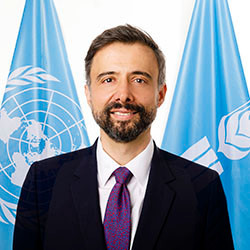The EU response to food crises and support to African resilience: Agro-ecological approaches and the Great Green Wall
IFAD Asset Request Portlet
ناشر الأصول
The EU response to food crises and support to African resilience: Agro-ecological approaches and the Great Green Wall
من Alvaro Lario
The aim of the Great Green Wall is to restore agricultural productivity and ecological health in the Sahel. It is a noble ambition. And the International Fund for Agricultural Development –IFAD -- is deeply committed to its success.
IFAD’s mission is to help small scale farmers, foresters and fishers produce enough food to feed themselves, their families, and their communities; and to generate enough income for a decent quality of life.
But how can they do that when temperatures are rising and production is disrupted by more and more droughts, storms and floods?
Today’s food crisis has been made worse by the pandemic and war in the Ukraine, which has inflated the price of grain, energy, and fertiliser.
But the Sahel has seen decades of problems linked to land degradation and competition for resources. Today, the region faces complex and connected problems including drought, biodiversity loss, poverty, hunger, unrest, and migration.
IFAD was created in response to crisis in the 1970s. For more than 40 years, we have worked with the most marginalised people in the most fragile areas in the world, including the Sahel. We have learned that it is possible to reverse land degradation and to support farming communities to feed themselves even during times of drought. We have learned that rural women and men living in poverty can improve their lives and livelihoods -- if only they are given the tools they need.
Our experience shows that investing in agricultural research and technology can help solve some of thedeepest problems. Agroecological approaches, which work with nature instead of against it exist, and are a big part of our solution. We also need social research, so we can be sure that our investments are reaching those who need them most, and that the benefits are long-lasting.
IFAD works at the forefront of these challenges to deliver impact and assemble finance. With the EU in particular, our partnership has been critical for investing in climate-resilient agriculture and long-lasting food security, even in times of crisis. I am delighted we will continue to work closely together in the EU’s response to the current crisis, as well as on agroecology.
IFAD has always put resilience of the rural poor and small scale producers front and centre. A decade ago, we created the Adaptation for Smallholder Agriculture Programme -- or ASAP -- exclusively dedicated to channelling climate finance to small scale farmers. And through ASAP+, 10 million more rural people will be better able to cope with the impacts of climate change.
We aim to achieve the biggest benefit for every dollar we invest. So we use our investments to assemble finance and leverage further investments from partners in the public and private sectors.
We have found that data is the best way to attract new partners for development. This helps us understand what works, for whom and how much.
And new partnerships are vital. Look at the numbers. The Great Green Wall initiative raised US$2 billion in its first decade. But for the next ten years, it will need US$3.6 to US$4.3 billion every year. This is the range of financial mobilization that is required if we want to help populations in developing countries to survive. To survive these current crises, and subsequent ones – because these will not be the last ones we will witness.
Climate change adaptation is crying out for funding. Small-scale farmers receive less than 2 per cent of global climate finance. It is an outrage that those who did and do so little to cause climate change are suffering so terribly from it. It is an injustice that they are receiving such a tiny portion of climate finance. Think about it.
Small scale farmers feed two-thirds of the world’s population. Growth in Africa’s agricultural productivity has dropped 34 per cent since 1961, largely as a result of climate change. We are playing with fire. Unless we invest sufficiently in Africa’s small-scale producers so they can adapt to climate change, many millions could starve.
We need to make food production across the Sahel zone more resilient, and we need to do it fast. That is going to take investment.
The Green Climate Fund and the Inclusive Green Financing Initiative are there to support the Great Green Wall. But funding needs to be coordinated, and invested well, in projects that generate the biggest possible impact.
IFAD has deep experience in blending finance from varied sources to reduce poverty and hunger. We look forward to working with everyone here today to strengthen our good partnerships and increase funding for adaptation so that the Sahel can become peaceful, prosperous, and green.
